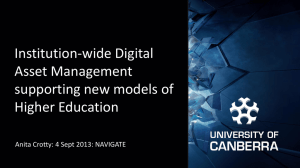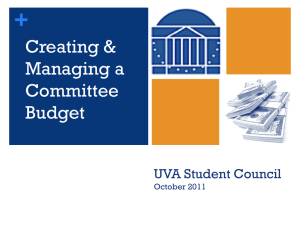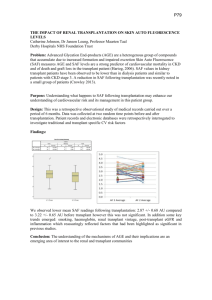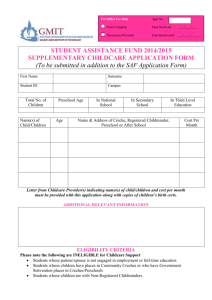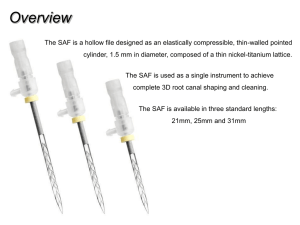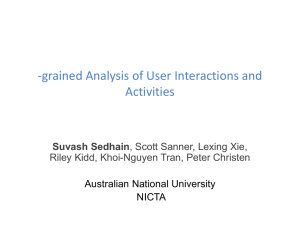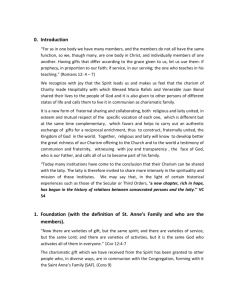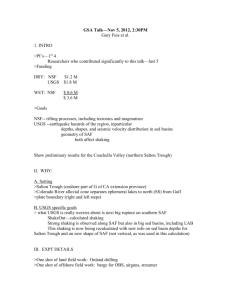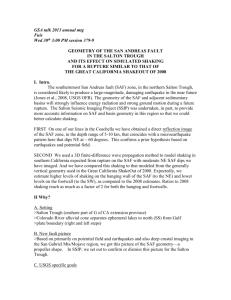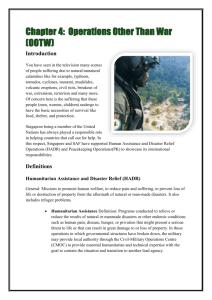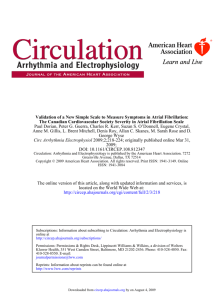SAF Program Components (1)
advertisement
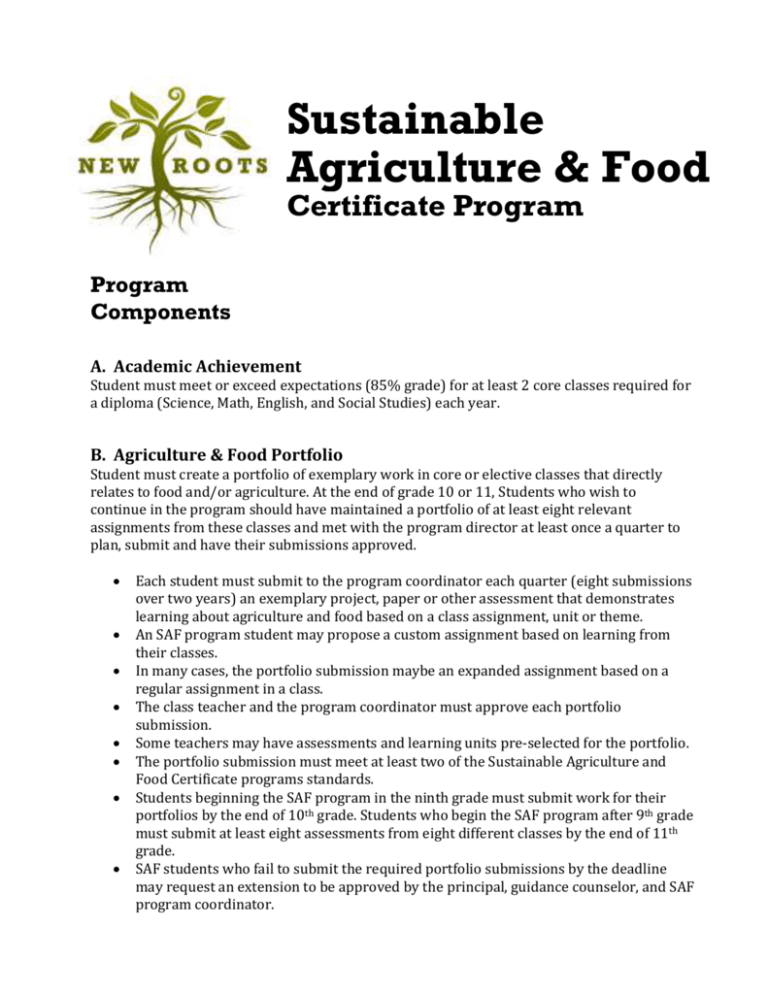
Sustainable Agriculture & Food Certificate Program Program Components A. Academic Achievement Student must meet or exceed expectations (85% grade) for at least 2 core classes required for a diploma (Science, Math, English, and Social Studies) each year. B. Agriculture & Food Portfolio Student must create a portfolio of exemplary work in core or elective classes that directly relates to food and/or agriculture. At the end of grade 10 or 11, Students who wish to continue in the program should have maintained a portfolio of at least eight relevant assignments from these classes and met with the program director at least once a quarter to plan, submit and have their submissions approved. Each student must submit to the program coordinator each quarter (eight submissions over two years) an exemplary project, paper or other assessment that demonstrates learning about agriculture and food based on a class assignment, unit or theme. An SAF program student may propose a custom assignment based on learning from their classes. In many cases, the portfolio submission maybe an expanded assignment based on a regular assignment in a class. The class teacher and the program coordinator must approve each portfolio submission. Some teachers may have assessments and learning units pre-selected for the portfolio. The portfolio submission must meet at least two of the Sustainable Agriculture and Food Certificate programs standards. Students beginning the SAF program in the ninth grade must submit work for their portfolios by the end of 10th grade. Students who begin the SAF program after 9th grade must submit at least eight assessments from eight different classes by the end of 11th grade. SAF students who fail to submit the required portfolio submissions by the deadline may request an extension to be approved by the principal, guidance counselor, and SAF program coordinator. Examples class units or potential themes Science: o Earth Systems Science I Quarter 1: Carbon & Nitrogen Cycles/Elements & Life Forms o Earth Systems Science II Quarter 1: Food Systems Focus Math: o Graphing, Measurement, and Probability Units applied to Culinary Arts or Agricultural Production Social Science selected curriculum or electives: o Global History 9, Quarter 1: Development of Agriculture o Global History 9, Quarter 3: Trade Routes & Agriculture or Agriculture under Feudalism and Manoralism C. Certificate Classes SAF Program students must meet or exceed expectations (85%) for five of the following required certificate classes. FoodShed Studies/ENVS110 Cafe Culinary Arts Sustainable Entrepreneurship Modeling for Sustainability Business Math Introduction to Permaculture (Spring Intensive) Others classes or intensives will be determined each semester that can meet the certificate requirements. D. Internship All SAF program students are required to complete 120 hours of agricultural or food systems related internship hours. Internships for the certificate requirements may begin at the end of the 10th grade year (including the summer) through January of their 12th grade year. The SAF Program Coordinator and the New Roots Internship Coordinator must approve internships. Interns must submit a timesheet recording hours and tasks completed. Their jobsite supervisor must sign the timesheet(s). At the completion of 120 hours, SAF students will write a 500 to 1000-word summary of their experience at all their internship work sites. E. Agriculture or Food-related Capstone Project. All New Roots Seniors must complete a Capstone Project for graduation. All SAF Certificate Program seniors must choose a social or environmental problem related to agriculture of food and propose and implement a solution to their chosen subject. 12th grade SAF students will meet with the SAF Program Coordinator at least once as quarter to report on the progress of the Capstone Project. Their Capstone teacher and the SAF Program Coordinator must approve all SAF Capstone Projects. F. Additional Requirements As opportunities for enrichment and learning occur, students in the SAF program may be asked to attend meetings, presentations and field trips. Any student in the SAF program may be asked to meet with the SAF Program Coordinator during school hours to discuss their progress towards meeting the certificate program requirements. Failure to attend special and scheduled meetings, presentations and field trips may be cause to be dropped from the program or to be put on probation until requirements determined by the school Principal, Guidance Counselor and SAF Program Coordinator are met. Failure to meet any of the programs requirements may be cause to be dropped from the program or to be put on probation until requirements determined by the school principal, guidance counselors and SAF Program Coordinator. Standards: Sustainable Agriculture & Food (SAF) Certificate Program A. Cultural Preservation and Transformation The preservation of agricultural and culinary histories and heritages, and the transformation of agricultural and food consumption practices contribute to sustainable communities. Students will develop the ability to discern with others what to preserve and what to change in order for future generations to thrive. B. Responsible Local and Global Citizenship The rights, responsibilities and actions associated with leadership and participation toward healthy and sustainable food choices and agricultural and culinary practices. Students will understand their rights and responsibilities and assume leadership and participation roles in their food system. C. The Dynamics of Systems & Change Food and agriculture systems are made up of two or more parts in a dynamic relationship that forms a whole whose elements ‘hang together’ and change because they continually affect each other over time. Fundamental patterns of systems include growth, decline and vacillation. Students will know and understand the dynamic nature of complex systems and change overtime. They will be able to apply the tools and concepts of system dynamics and systems thinking to food consumption and agriculture in their present lives and to inform the choices that will affect our future. D. Sustainable Economics The evolving theories and practices of economics are shifting towards integrating our economic, natural and social systems to support and maintain life on the planet. Students will know and understand 21st century economic practices and will produce and consume agricultural products in ways that contribute to the health of the financial, social and natural capital. E. Healthy Commons Healthy Commons are that upon which we all depend and for which we are all responsible (i.e., air trust, biodiversity, climate regulation, our collective future, water, education, public health, heritage, soil, etc.) Students will be able to recognize and value the vital importance of the Commons in our agricultural and food systems. Hey will assume the rights, responsibilities and actions to produce and consume agricultural products to care for the commons. F. Natural Laws and Ecological Principles The laws of nature and science principles of sustainability. Students will see themselves as interdependent with each other, all living things and natural systems. They will be able to put their knowledge and understanding to use in agriculture and food production. G. Inventing and Affecting the Future The vital role of vision, imagination and intention in creating the desired future. Students will design, implement and assess actions in the service of creating their individual and collective visions for food and agricultural policies. H. Multiple Perspectives The perspectives, life experiences and cultures of others, as well as our own. Students will know, understand, value and draw from multiple perspectives to co-create with diverse stakeholders shared and evolving visions to produce healthy food and sustainable agriculture locally and globally. I. Sense of Place The strong connection to the place in which one lives. Students will recognize and value the interrelationships between the social, economic, ecological, agricultural and culinary history of that place and contribute to its continuous health.
